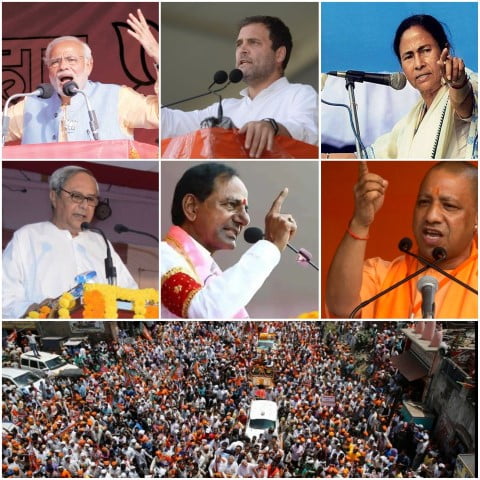The Shift From Positivity To Negativity: How Election 2019 Is Different From 2014

The general election of 2014 was about hope and expectations. The election of 2019 is about redefining the idea of India. Rewind to the speeches of Prime Minister Narendra Modi in 2014 and listen to him now and compare the salient points in both. The differences stand out stark.
While Modi’s 2014 election campaign spoke about a new India articulating and actualising the aspirations and dreams of the youth, an India safe for women and all communities and an India on a fast trajectory of prosperity, the accent this time is on a reductive theme revolving around national security, Hindutva and nationalism. The election five years ago was about fresh ideas and new enthusiasm at nation-building, the focus this time is nowhere close to being as lofty.
The BJP under Modi is not even being shy about flaunting the agenda to create an India of Sangh Parivar’s dreams. It is bare and out in the open. This makes the ongoing election so critical to the fate of the nation. A loss for the parties in the Nehruvian mould would mean goodbye to the old India that swore by the higher values of the Constitution and the beginning of an era fraught with strange new equations among Indians and uncertainties sprouting thereof.
The India which voted in 2014 was driven by positive instincts. It wanted change, an escape from the old and predictable. This time, three factors stand out. One is negativity. There is a lot of anger in the air and a lot of hatred going around. People are divided along ideological lines than ever before. More fault lines in the Indian society are visible than earlier. It’s a bristling India that is participating in the election to avenge grievances, both manufactured and imagined.
The second is the impact of the personality cult. No leader left India as divided as Narendra Modi. Credit must go to him for being the subject of such mass adulation and winning the undiluted trust of so many Indians, but the negatives of this trend far outweigh the positives. Bring him up and family members get divided, friends get into scuffles and even strangers pounce on each other.
Politics, a political figure in particular, never penetrated this deep into the national psyche and generated both intense love and hate in this manner. By all indications, this election is about Modi. It is not about a new India. He might stay or go, but the impact of the personality cult will leave the country scarred for a long time.
The third is the trivalisation of real issues. Excessive focus on a single individual and a few peripheral matters such as Hindutva and nationalism has virtually closed any scope for a discussion on matters such as unemployment, sagging economic growth, crisis in agriculture, trouble in the manufacturing sector, the rot in the areas of health and education etc. Add to all of this, signs of institutional decay, which call for a reasoned debate.
The for-or-against sentiment-heavy binary that people have been drawn into has foreclosed any possibility of the role of logical thinking. Being ideology-neutral is no more an option for ordinary Indians. They have to take sides and be damned. The trend is worrisome. The results on May 23 will make it clear whether we are moving deeper into the morass.
The normalisation and further consolidation of the three – political role of negative sentiments such as anger and hate, personality worship and irrelevance of everyday issues – is set to define, if it is a BJP victory, the basis of a new India. Modi, by design or default, appears to be the man marked to be the agent to watch out for.
Disclaimer: The views and opinions expressed in this article are those of the authors and do not necessarily reflect the official policy or position of any agency of the web portal.

Comments are closed.